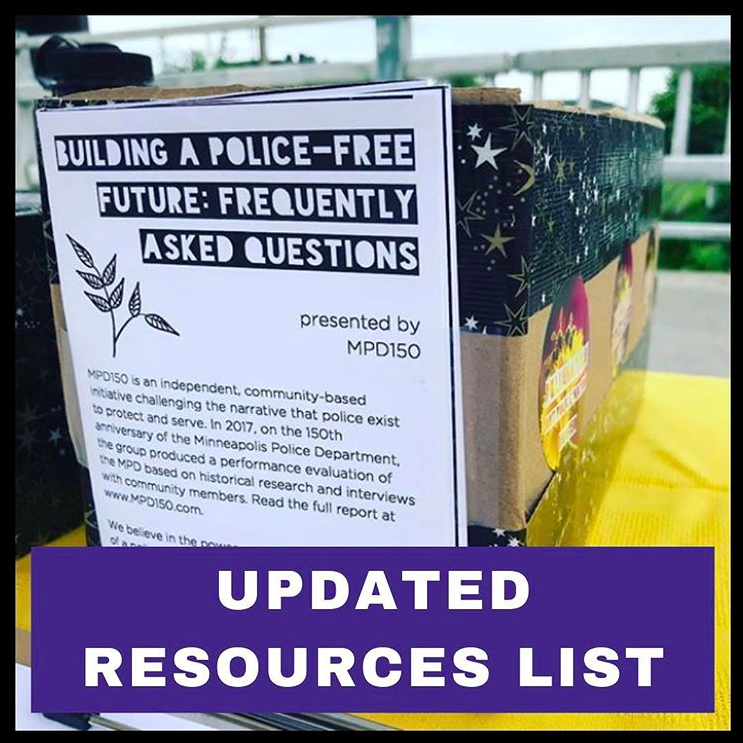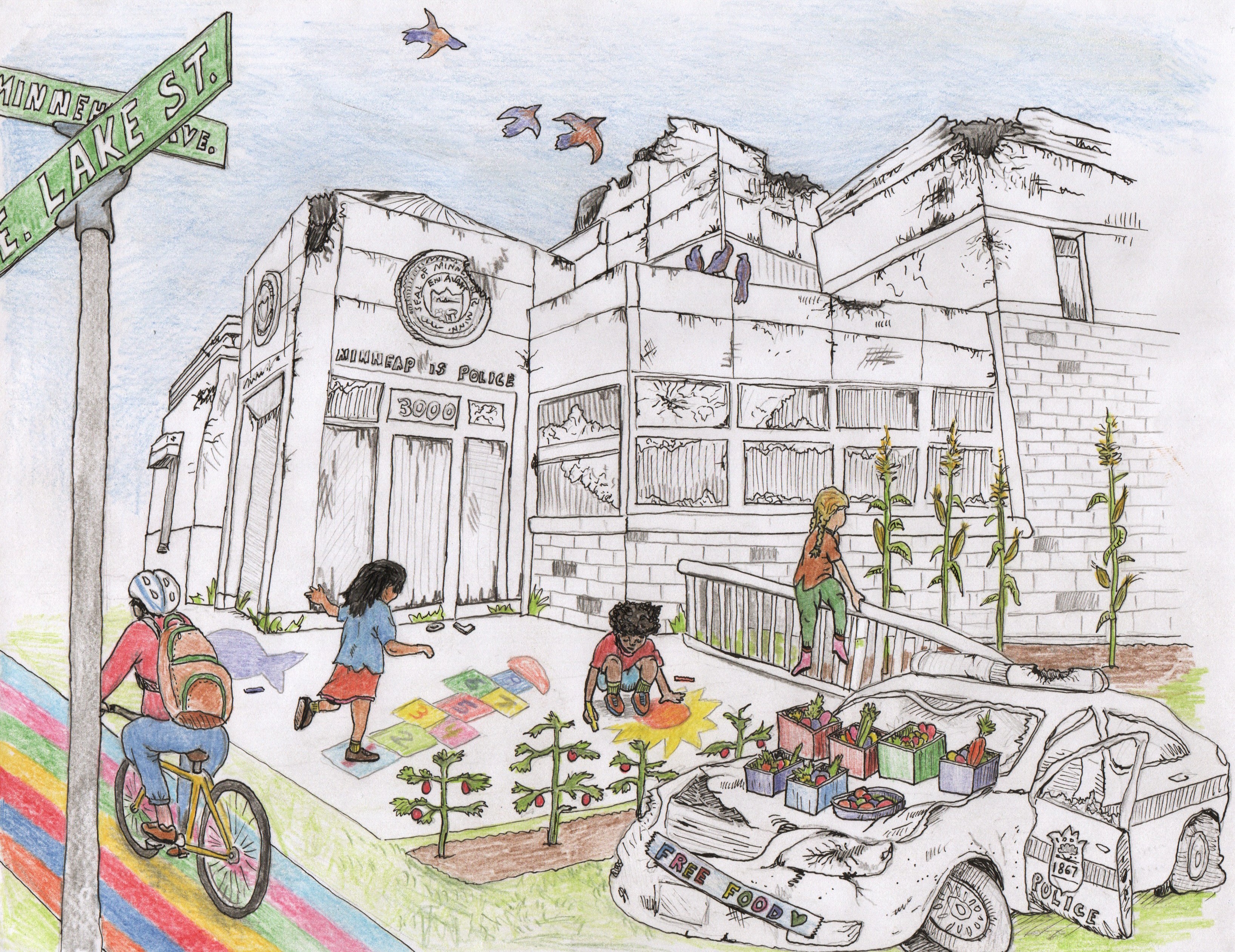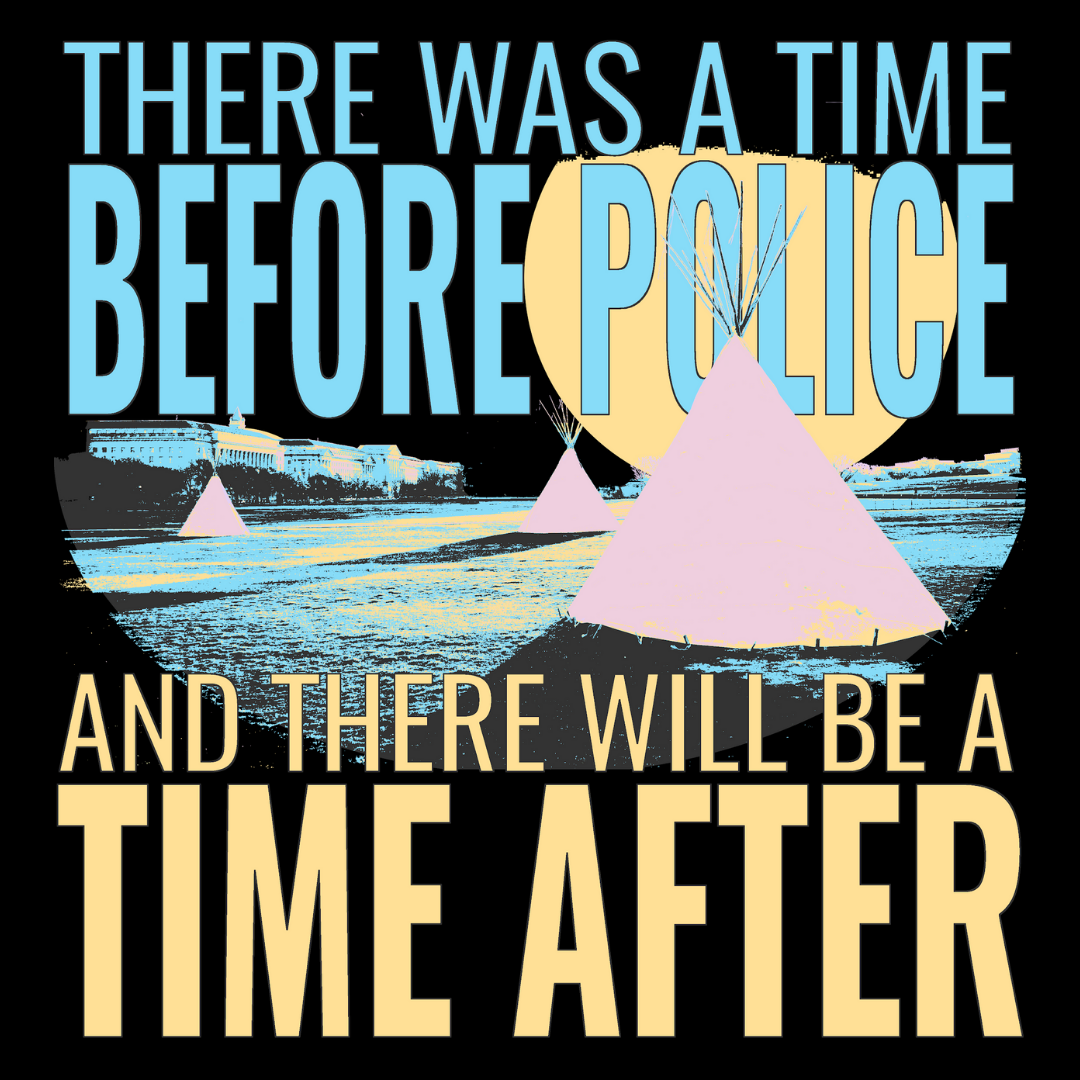(Image by Jared Ingebretson and Nikki Ann; check out their full caption here)
EDIT (August 24, 2020): This piece was written and posted in the immediate aftermath of the murder of George Floyd, and some of the specific information reflects that. We’re leaving it up, though, since even as some details shift or become outdated, the larger point here remains: people have power. We can build the police-free future we need, together, and this piece shares a few ideas for how people can plug into that work.
~~~
There are already plenty of thinkpieces and google docs floating around sharing action steps, places to donate, and ways to support the community both in Minneapolis and every city having an uprising right now after the murder of George Floyd. This is going to be a little different.
We’re not here to tell people what to do; a lot of our people here in Minneapolis already know what they’re doing: they’re coordinating donation drop-offs, buying groceries for neighbors who can’t, offering medic services, and working together on a range of formal and informal community-driven mutual aid projects. They’re also demonstrating some of what our police-free future might look like.
But if you’re someone who isn’t already engaged like that, and are just looking for ways to help, first: thank you. Second, here are three critical questions to ask as you figure out how best to plug in.
HOW CAN WE SUPPORT ORGANIZERS AND FRONTLINE ACTIVISTS RIGHT NOW, AND BEYOND THIS MOMENT?
Lots of people want to get involved, but abolitionist groups aren’t always equipped to take on waves of new volunteers. This may not be true for every group everywhere, but you will very likely not be able to just “show up to the next meeting,” especially right now. So what can you do?
Pay attention: Sign up for email lists, sign petitions, and follow organizations like Reclaim the Block and Black Visions Collective on social media. They are not the only groups doing this work, but right now, they’re both go-to resources for it in Minneapolis. Their work, and the work of similar organizations in other cities, is going to continue beyond this moment, so being connected to them can position us to respond to specific calls to action.
Show up, but think critically about what showing up can mean. Minneapolis is full of volunteers right now – sweeping up, handing out food, and looking out for one another. Answer calls that specifically request volunteer support on the ground, while also being cautious not to overwhelm hyperlocal organizers for whom your presence may be more stress than help (especially if you’re from somewhere else – are there opportunities closer to home to make a difference?). The next point will discuss some other ways to “show up.”
HOW CAN WE USE OUR PLATFORMS, PRIVILEGE, AND POWER IN THE MOST EFFECTIVE WAYS?
We all need to show up. But we’re also all different- from different places, holding different identities, and with different skills. It is okay if you can’t be out on the streets for every march or protest. It is okay if you don’t have disposable income to donate. It’s on us to be creative, and do what we can, where we can. This question is relevant to everyone, but it’s especially vital for non-Black people of color and white people to think really critically about this. A few thoughts:
A note on donating: Donations are great, but many of the local organizations you’ll see on those viral “organizations to support” posts may not actually need more money right now (we’re one of them). A few other options:
- Check out efforts to redirect donations to other organizations and efforts on the ground, and to individual organizers who don’t work through organizations at all.
- The Lake Street Council has raised $2 million to rebuild businesses on the South side; let’s be sure to support the North side too (hat-tip Black Visions Collective); find even more resources in this document put together by council members Ellison and Cunningham.
- For an incredible example of what community can do when we work together, check out the MPLS Sanctuary project; they’re going to need more support, too.
- If you’re not in Minneapolis, be sure to look for ways to support organizing, bail funds, etc. closer to home! It may take some online searching, and some asking around, but this work is happening in a lot of places.
How can abolitionist principles be integrated into our everyday work? It isn’t just about running out to the protest; it’s also about bringing the protest into our everyday lives. How can we be representatives of the world we’re working toward, and bring it to life via our schools, places of worship, workplaces, and beyond? Some real-life examples:
- Black youth organized for years to get school resource officers out of schools and redistribute those costs to counselors and other services. A few days ago, the school board and teachers’ union called on the district to cut ties with police. (Update: the Board voted unanimously to cut ties).
- The University of MN cut ties with MPD.
- Businesses, museums, and other institutions can do the same (like First Ave, the Walker Art Center, etc. here in MPLS).
- Churches and other places of worship can make the choice to not call the police.
- We know so many teachers, faith leaders, youth, artists, and beyond who have taken the initiative to start anti-oppression committees, dialogue groups, giving programs, public art projects, reparations efforts, and much more.
- Be creative. There is no one answer we can give you for how to make a difference here. Google what’s going on in your city. If you don’t find anything, it’s okay to start small. The answer isn’t always a big rally (especially if you don’t have experience with safety, security, and organizing actions); consider resources like Deepa Iyer’s “My Role in a Social Change Ecosystem” for more thoughts on how we can align our talents and interests with what is needed.
A note on healing, trauma, and sustainability: This struggle isn’t going to be over when the curfew ends. How are we positioning ourselves to be effective activists and advocates beyond this moment? The answer to that is going to be different for people based on the identities we hold and how directly impacted we are by police violence. Black, indigenous, and people of color organizers may be dealing with the stress of this week, on top of past experiences with police violence and/or protest, on top of generational trauma. There’s no shame in being triggered, and no shame in stepping back. And for white folks: take care of your emotional needs with each other, so you don’t put that labor on the BIPOC organizers you are showing up to support.
- This week, we’ve seen things like rural organizers opening up their homes to Black activists who need some space, people getting groceries and making food for activists who have been on the move nonstop, and groups like the MN Healing Justice Network sharing all kinds of valuable resources related to healing and community care.
How are we reaching people who aren’t on social media? So many of us experienced these protests in person, and/or on social media. But most people aren’t on Twitter. People who just watch the nightly news may have a very different view on what’s happening. Let’s have more conversations with family and friends, utilize email lists, and talk to our neighbors. Let’s debunk the common myths and misleading narratives about police, protest, and abolition. More on this in the next point.
HOW DO WE MAKE SURE WE’RE NOT ASKING THESE SAME QUESTIONS NEXT YEAR, IN FIVE YEARS, OR IN FIFTY YEARS?
 One thing we’ve observed over the past week here in Minneapolis is that the conversation we’re having- in the streets, in the media, and with our families/friends, is very different than it was during previous protest movements against police brutality. We aren’t hearing much “reform now” talk, or “cops should be nicer” talk, or even “prosecute the police” talk. We’re hearing calls to abolish the police- to defund them, and redistribute those resources directly to our communities.
One thing we’ve observed over the past week here in Minneapolis is that the conversation we’re having- in the streets, in the media, and with our families/friends, is very different than it was during previous protest movements against police brutality. We aren’t hearing much “reform now” talk, or “cops should be nicer” talk, or even “prosecute the police” talk. We’re hearing calls to abolish the police- to defund them, and redistribute those resources directly to our communities.
It shouldn’t be a surprise- although police violence has been an issue for the past 150+ years here, we’ve lived the last seven years on social media, seeing again and again the utter failure of reform. As Philip V. McHarris and Thenjiwe McHarris wrote in the New York Times:
“Look at the Minneapolis Police Department, which is held up as a model of progressive police reform. The department offers procedural justice as well as trainings for implicit bias, mindfulness and de-escalation. It embraces community policing and officer diversity, bans ‘warrior style’ policing, uses body cameras, implemented an early intervention system to identify problematic officers, receives training around mental health crisis intervention, and practices “reconciliation” efforts in communities of color. George Floyd was still murdered.”
With all of that as context, of course more people are open to abolitionist ideas right now.
So if we want to help build a world in which we’re not having the same cyclical conversation over and over again, it’s going to take some political education work. And yeah, we’re in the middle of an uprising, so “start a book club” might not be the most relevant advice for everyone. But for a lot of us, especially those of us who are not immediately engaged in community defense, we need to be thinking about how to spread these ideas, so that when our city council is voting on a divestment measure, we can mobilize public pressure. A few tools to consider:
- Check out the newly updated/revamped Resources page right here. We pulled together all of our resources, as well as some fantastic readings, links, and toolkits from other organizations, writers, and scholars. There’s also a whole section with just links from this past week. Read them, share your favorites online, organize that book/article club, integrate them into your curriculum, and start conversations.
- BONUS UPDATE (6/10/20): If the Resources page is overwhelming, here’s a potential starting point.
- A note on curriculum: the upcoming, expanded remix of our report will contain a section on curriculum ideas and discussion questions for educators. UPDATES: the expanded report is available here, and there’s a companion curriculum via Ed Lib MN here.
A last note: In the past couple days, Minneapolis City Council members have used language like:
- “The department is irredeemably beyond reform.” (Fletcher)
- “Minneapolis is ground zero for us collectively learning policing in its current form simply *does* *not* *work.*” (Ellison)
- “Even officers tell me they aren’t the best equipped for a myriad of issues like mental health crises, drug overdoses, and even domestic violence, but there seems to always be political will to increase their funding.” (Cunningham)
- “The Mpls Police Department is not reformable.” (Cano)
- “It is clear to me that our attempts at incremental reform of policing have failed. We need deep, structural change.” (Bender)
This shift in rhetoric is important, but it isn’t enough. The work to continue to put pressure on politicians, institutions, and one another to divest from police, punishment, and the whole prison-industrial complex will continue. We hope you’ll join us.

